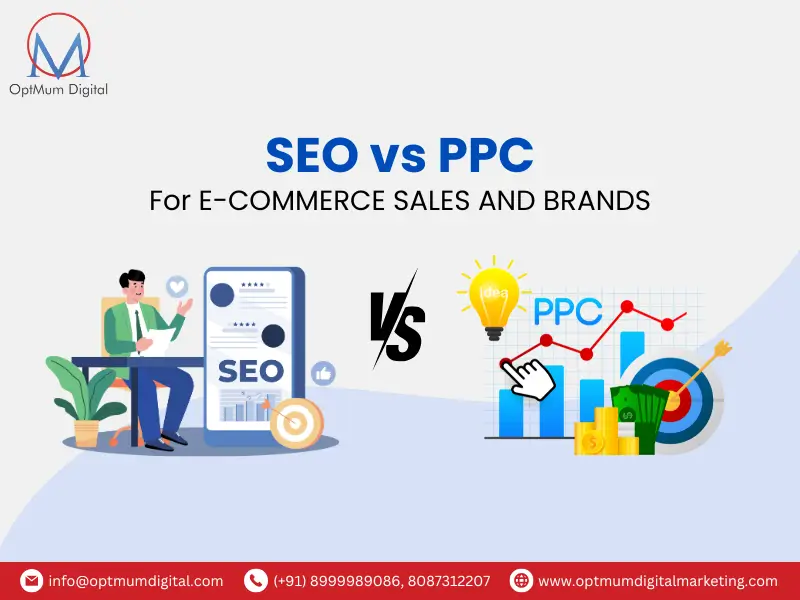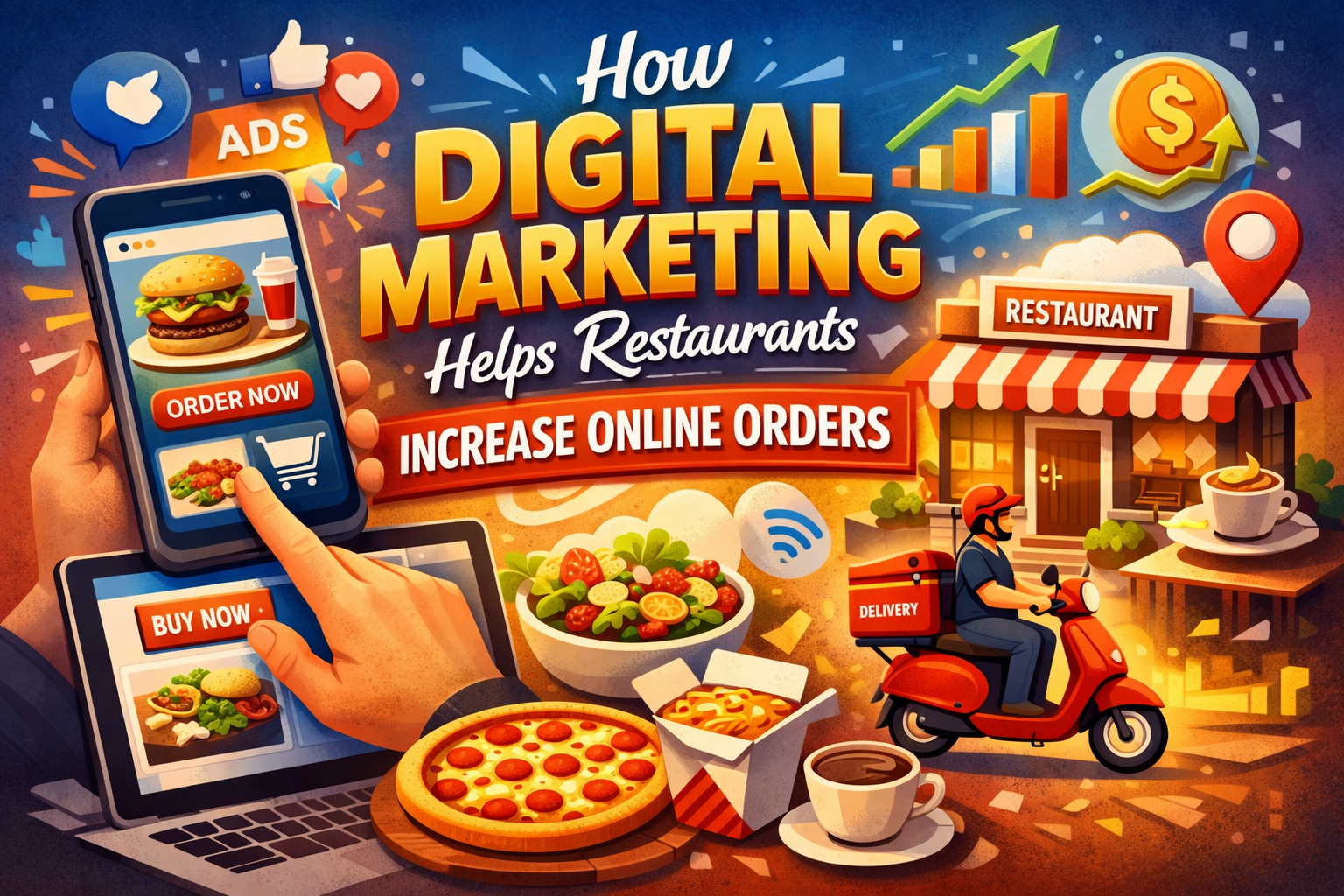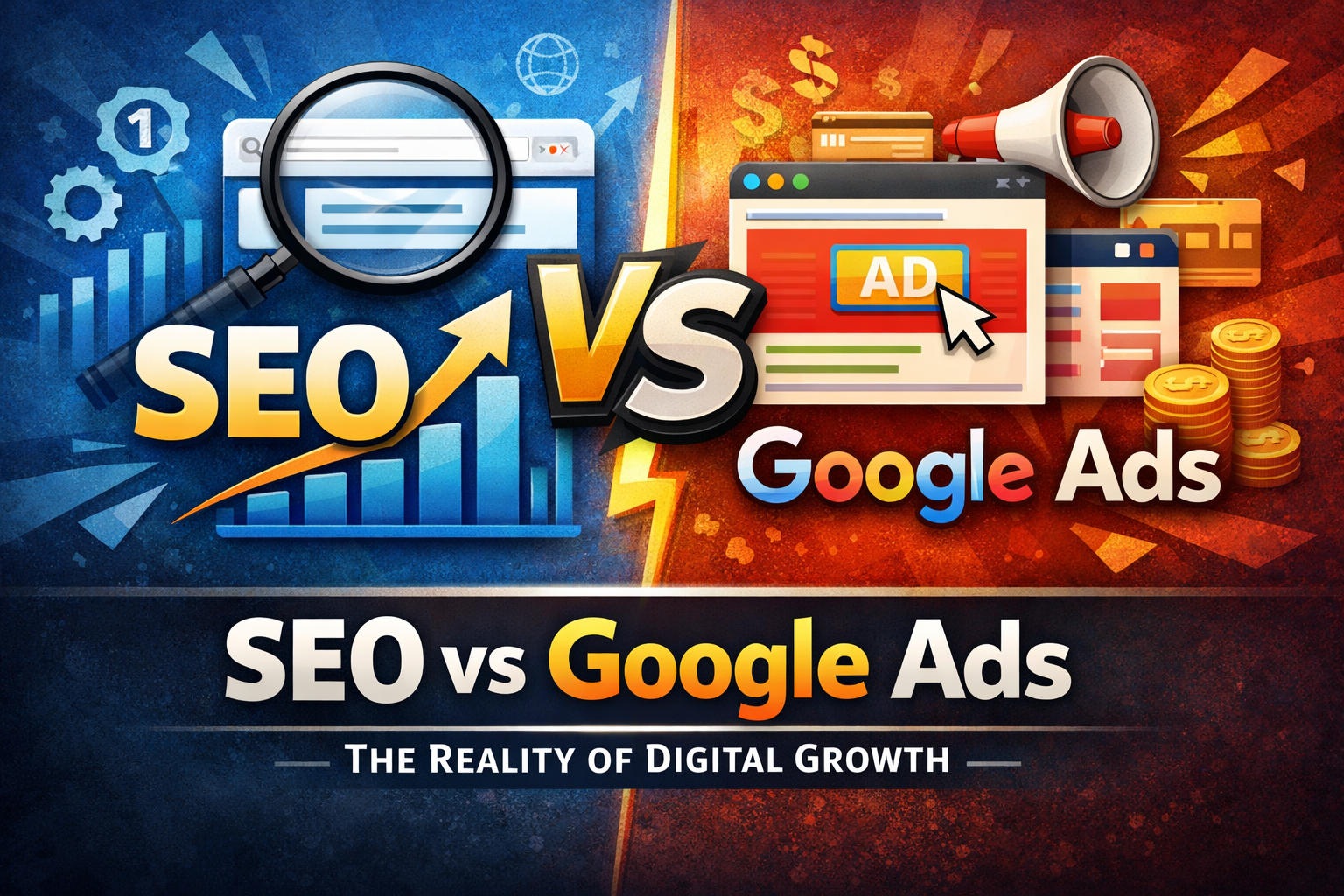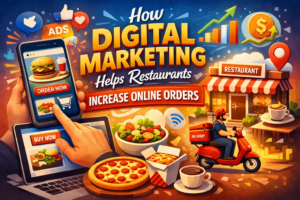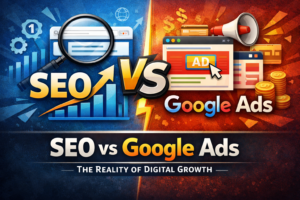SEO VS PPC FOR E-COMMERCE BRANDS
Digital Marketing in the competitive world of e-commerce is vital. It helps drive traffic, boost sales, and establish a strong online presence. SEO and PPC are two very common methods. They increase website visibility and attract customers.
SEO VS PPC for e-commerce sales – which one is better?
SEO VS PPC FOR E-COMMERCE SALES
What is the difference between the two SEO VS PPC for e-commerce sales?
The key differences is in terms of
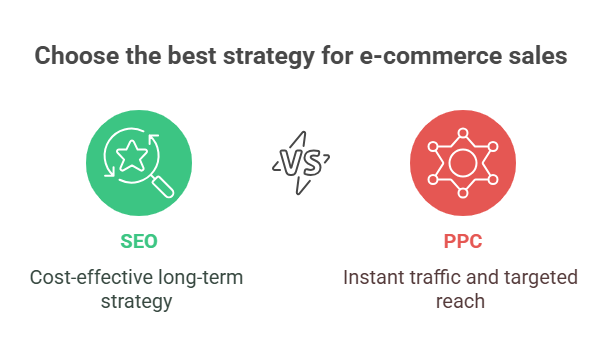
TRAFFIC ACQUISITION
SEO
- Traffic is organic. This means you don’t pay for clicks or impressions. Once you achieve good search rankings for relevant search terms, a steady flow of traffic can be maintained without additional cost.
- Top search rankings can however take time. The competition for popular keywords can be intense.
PPC
- Provides instant results. You can set-up a campaign and start attracting traffic instantly. However as soon as you stop paying for ads, traffic stops.
- Traffic can be highly targeted. Only certain people get to see your ads. People who actively search for what you sell.
COST-CONSIDERATIONS
SEO: Has typically a lower upfront cost. But it requires time and effort to optimize your website and rank for valuable keywords. You would need to hire an SEO Agency or Specialist, Invest in Content Creation, OR Spend time building backlinks. The ongoing costs however once you start ranking are minimal. This makes SEO a more cost-effective long-term solution.
PPC: Requires a budget for bidding on keywords. This depends on the competitiveness of your industry. However the costs can rise quickly. PPC for highly targeted e-commerce niches can become quite expensive. Some cost-per-click (CPC) rates can reach a high figure or even more. Overall, PPC offers precise control over your budget. This allows you to pause or adjust campaigns as required.
CONVERSION RATES AND ROI
SEO: Leads to high-traffic quality organic traffic which is often highly relevant. It can also provide long-term ROI but the results can take months to fully realize and the competition can be intense. Once your website is established on search rankings, conversion rates tend to be strong. This is especially so for niche markets.
PPC: Allows full control over targeting, bidding, and ad copy. This means you can tailor your ads to your ideal customers. PPC’s immediate nature often leads to faster conversions. Especially if you have well-optimized landing pages. However, ROI can be variable. This depends on how well you manage and optimize your campaigns.
LONG-TERM BENEFITS OF SEO VS PPC FOR ONLINE STORES
The long-term benefits of SEO VS PPC for online stores, depend on your business model, goals, and available resources. Both strategies can however be highly effective with different benefits over time.
SEO offers significant long-term benefits.
Your website once it achieves strong rankings on Google search results can continue attracting traffic. This can be done without additional investment. Over time you can build a robust online presence on search engines. This leads to greater brand authority and trust. Furthermore, SEO has a compounding effect. The easier it becomes to maintain and improve rankings if you can create quality content. Also, the more authoritative your website you will become. At the same time, SEO is not a one-time fix. You need to
SEO
- Update regularly your content.
- Ensure your website is technically optimized.
- Keep up with algorithm changes from search engines like Google.
PPC
- Can generate immediate results with continuous investment. However it does not offer the same long-term benefits as SEO.
- Can test different ads, keywords, and landing pages. This is to optimize your campaigns for conversions.
PPC being a paid strategy can offer benefits only as long as you are willing to continue paying for your campaigns. The moment it is stopped, the traffic disappears. This makes it less sustainable in the long run. But it can be an effective short-term tool. Like for instance, realize goals; and during peak sales periods like holidays or product launches.
SEO VS GOOGLE ADS FOR E-COMMERCE WEBSITES
Which is more effective – SEO VS Google Ads for e-commerce websites Both can be effective in their own way as they serve different purposes.
SEO
- Offers long-term visibility.
- Establishes trust with customers when ranking organically in Google search results.
They lead to over time more consistent and predictable traffic. However, the results can take a long time to achieve, often several months.
GOOGLE ADS
- Offers immediate visibility through paid search results. Ads appear on top of Google search results. This can help you capture attention quickly.
- Is less sustainable in the long run. Traffic stops as soon as stop paying for ads.
The best approach for e-commerce stores would be a mix of both. Google Ads can be used to generate immediate traffic. SEO on the other hand is useful for building sustainable growth over time.
COST Comparison SEO VS PPC FOR E-COMMERCE
You must consider when evaluating a comparison SEO VS PPC for e-commerce, both short-term and long-term expenses.
SEO
- Cost can vary significantly. This is based on your website’s complexity and the industry’s competitiveness. Besides, hiring an SEO agency can be per month anywhere between several thousand rupees.
- Does not need ongoing ad spend. However the time and resource investment can be substantial. But ultimately, you benefit as once your website achieves higher ranking, the cost of maintaining SEO efforts is lower than running a PPC campaign.
PPC
- Costs depend on your industry and bidding strategy, and the competitiveness of the keywords. It can be steep in highly competitive e-commerce sectors. In niches like electronics or luxury goods. You could end-up paying more rupees per click.
- Have full control over your budget. You can scale your campaigns as per your sales targets.
SEO tends to be in the long run more cost-effective. This will benefit e-commerce brands looking to scale and build a sustainable online presence. PPC on other hand, provides immediate results. But it can only realize effective short-term goals.
BEST DIGITAL MARKETING STRATEGY FOR E-COMMERCE GROWTH
Which would be the best digital marketing strategy for e-commerce growth? A fusion of SEO and PPC would be better. This however depends on your needs and goals. Here is how you can create a balanced strategy.
BEGIN WITH PPC FOR QUICK WINS: If you are new to the commerce field or launching new products, consider using PPC. They drive immediate traffic and also test your products in the market. Google Ads and Facebook Ads can help gauge demand and generate sales quickly.
INVEST IN SEO FOR LONG-TERM SUCCESS: PPC can deliver quick results. However investing in SEO will help build a more sustainable and cost-effective online presence. To capture organic traffic over time, focus on optimizing your product pages, blog content, and other of your site elements.
USE BOTH IN TANDEM: Synergize the long-term benefits of SEO with the instant results of PPC. You can for instance use PPC campaigns to target high-competition keywords. SEO can be used to build your online presence on less competitive terms.
CONCLUSION
Which is better – SEO VS PPC for e-commerce sales? There is no one definitive answer. Both have their own merits. The right approach would depend on your specific business goals, resources, and timeline. For long-term, sustained growth with sustainable traffic, SEO is a better option. On the other hand, for immediate results with highly targeted traffic, PPC is a better option as it can offer instant visibility. The best digital marketing strategy for e-commerce growth would be a mix of both. Each method can be used to complement the other. Begin with PPC to drive quick results. Then, later invest in SEO for long-term success with sustained growth.
Leading digital marketing agency, OptMum Digital Marketing, offers results-driven SEO and PPC services. You can by leveraging its services make more informed decisions. This will help realize the best path for your online store’s success.
frequently asked questions
They are two different digital marketing strategies. Ecommerce brands use them to drive traffic and increase sales. SEO focus is on optimization of website and content to rank organically on search engines. It offers long-term, sustainable growth. PPC on other hand, involves payment for ads. Like Google Ads, that appears on search results or on websites. It delivers quicker results with an ongoing cost.
There is no one specific answer. Both have their own benefits. SEO is ideal for long-term growth and building organic traffic. They can be in the long run more cost-effective. PPC can deliver immediate results and generate quick sales. The best approach for ecommerce brands would be a combination of both. That is, using SEO for sustained visibility and PPC for targeted campaigns, to drive immediate conversions.
SEO
- Ability to generate organic traffic over time. Once your website ranks well on Google, it will continue getting traffic without needing to spend extra per click.
- Builds brand credibility and trust with users.
PPC
- Can bring in fast traffic.
- Allows for precise targeting, immediate results.
- Ability to scale quickly.
However, PPC’s long-term benefits are limited. Traffic stops as soon as you stop paying for ads. It is good only for short-term campaigns or promotions.
It all depends on your goals.
SEO
- Is a long-term strategy.
- The focus is more on improving organic search rankings. This provides sustainable and cost-effective traffic.
Google Ads
- Is a form of PPC.
- Provides immediate visibility through paid ads. This can be especially effective for high-converting keywords.
- Promotes specific products or promotions.
For a long-term online presence, SEO is often the best option. However, if you are looking for immediate sales or boost traffic during peak periods, then Google Ads delivers quicker results.
SEO
- Involves high initial investment in website optimization, content creation and technical SEO. However ongoing costs are lower once website ranks well.
- Main cost is time and effort spent on optimizing the website or hiring an SEO expert.
PPC
- Involves continual cost. You pay for each click on your ads.
- Cost-per-click (CPC) can vary depending on competition, industry, and keywords.
PPC is more expensive over time, if not managed carefully. However, it delivers instant traffic. It can also be more predictable in terms of budget.
A combination of SEO and PPC. It is the best digital marketing strategy for e-commerce growth. You can by leveraging SEO build a solid organic foundation. This drives long-term traffic. PPC can be used to boost short-term results. It also helps drive sales and target high-converting keywords.
Yes, you can. Many e-commerce brands do that. SEO and PPC can be used to maximize online presence. SEO helps to build organic search visibility. PPC on the other hand drives immediate traffic and conversions. When both are combined, you get to cover more ground, target a broader audience, and achieve a well-rounded digital marketing strategy.

